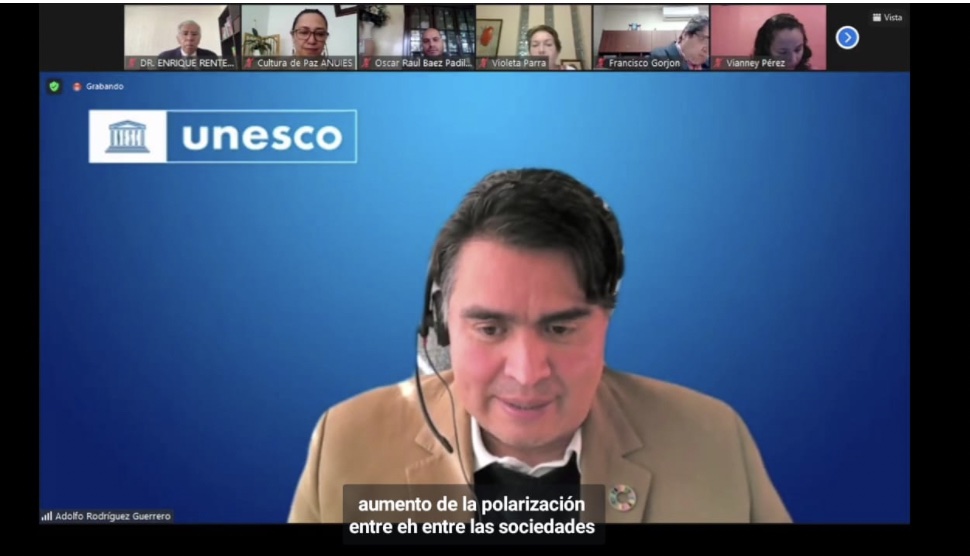… EDUCATION FOR PEACE …
An article from ZHN Zacatecas Hoy
In order to investigate the alternatives and strategies to implement a culture of peace program in educational systems, professors from the United Nations Educational, Scientific and Cultural Organization (UNESCO ), participated in a discussion entitled “Experiences of the UNESCO Chairs of the Latin American and Caribbean Region”.

Adolfo Rodríguez Guerrero
To initiate these activities, the program coordinator of the education sector of UNESCO in Mexico, Adolfo Rodríguez Guerrero, indicated that the function of these Chairs is to support the solutions of the problems of sustainable development that are being presented during the last 20 or 30 years.
He explained that the UNESCO Chains is a program that contributes actions and reflections. they contribute to the collective intelligence, knowledge and innovation that is generated by universities in search of global citizenship.
Rodríguez Guerrero stressed that this specialized unit of the United Nations in our country is working for sustainable development through two elements: a global culture of peace and sustainability through an educational innovation, that is, a change in higher education that promotes knowledge and learning digital through new information technologies.
The coordinator of the UNESCO Chair of the National Autonomous University of Mexico (UNAM), Gloria Ramírez Hernández, focused on explaining the importance of human rights in the work that has been carried out in these Chairs since 1992, promoting values, attitudes and behaviors that reflect respect for life and eradicate violence in all its forms.
(Article continued in right column)
How can we promote a human rights, peace based education?
Is there progress towards a culture of peace in Mexico?
Will UNESCO once again play a role in the culture of peace?
(Article continued from left column)
She pointed out that these actions seek to reinforce the human rights and freedoms of each person, visualizing the culture of peace as a preventive action through the construction of democracy and the management of conflicts, resolving them with peaceful means.
Explaining her experience as a coordinator of this chair in the UNAM, the speaker highlighted her work of developing consciousness about the application of human rights. This is done by research, teaching and dissemination through fields of knowledge, lines of research and projects that seek to prevent violent attitudes.
One of these projects is the National Program of Education in Human Rights, which has the objective of promoting a culture of defense, promotion and response in human rights in all types, levels and modalities in a comprehensive approach that favors governance, democracy and peace.
Finally, the professor stated that “peace cannot advance without women”, and she mentioned that “conflict and humanitarian crises impede the access of women and girls to progress, including the right to food, education, security and health, as we are immersed in a social and economic collapse, especially in a post-pandemic context”.
For his part, the coordinator of the UNESCO “University and Regional Integration” Chair, Axel Didriksson Takayanagui, spoke about the transformation that must take place in the public university of the Latin American and Caribbean Region for a curriculum in a culture of peace and critical and analytical thinking.
The professor stated that the development of the Chairs UNESCO, will provide bases so that May of this year the UNESCO World Conference on Higher Education presents the importance of implementing a culture of peace, considering that as a priority human right for inclusion, equity and educational transformation.
With regard to this international conference, the renowned researcher commented that this is the third edition of this type of academic activity. It will take place at the University of Barcelona in Spain. “This will be a space in which models will be analyzed by innovators and visionaries in higher education from around the world.
The coordinators of these talks at the Autonomous University of Zacatecas were the university professors Juana Elizabeth Salas and Oscar Padilla.